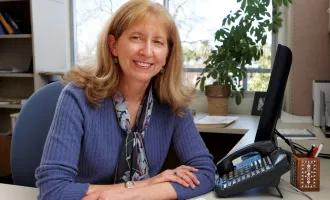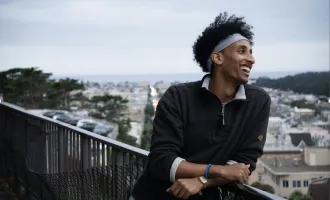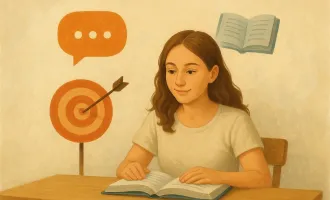Diversity Spotlight: Grappling with Identity and Culture with Joselyn Del Cid
Have you ever wondered, what culture truly means? More importantly, how does an individual’s culture and diverse experiences contribute to their identity?
Deep, right? Let’s take a breath. The beauty of these questions is that there may not be one definitive answer. When asked to give an opinion on promoting diversity on campus, a lot of students believe that the answer is a very obvious, “Yes!” Do we really understand why promoting diversity should be a priority? Is promoting diversity another ideal or do we truly understand the perspective of those coming from diverse backgrounds?
This piece features a few of these answers from Joselyn Del Cid, a fourth year graduate student in Dean Sheppard’s lab at UCSF. Del Cid is also the president of the Society for Advancement for Chicanos and Native Americans in Science (SACNAS) at UCSF.
Editor’s note: The following interview transcript has been shortened and lightly edited for clarity.
Synapse: How was your childhood?
Del Cid: I was originally an illegal immigrant. Born in El Salvador, I came to the United States when I was four years old at the tail end of the civil war. We were political refugees. My dad worked in the military, my mum was a military nurse, and everybody was on the hit list… My parents moved from El Salvador to get us away from the misfortune that was in our country at the time and so my childhood was very different.
There was always this idea of “you should be grateful for what you have and you’re going to get this great education”. My parents gave up a lot to bring my sister and me to what is considered this great country, USA. My parents only hoped for us to know how to read and write and they would be very proud of us if we did that. But that was all. They just wanted us to graduate high school, and give us the opportunity to get a job and make a living here. In that way, my childhood was molded strongly by my parents desire for me to get educated. The fact that they forced us to get that high school education opened our eyes to the idea that we could make a bigger contribution to our world. I think they were beyond amazed and incredibly proud that my sister and I have both gone on to PhD programs.
It’s not that didn’t have high hopes for us, it’s just that they didn’t know better. Culturally, going to elementary school was compulsory until about fifth grade, but after that if you didn’t want to go to school that was fine too. And that’s why there’s a huge population that still remains uneducated. We never planned to be this educated, our parents didn’t plan on it, but it kind of serendipitously happened.
Synapse: What about your childhood experiences got you interested in science?
Del Cid: Actually, growing up, I had no idea what science entailed. My entire family is not as educated, so I didn’t have any role models in my family. I always thought that if you’re a scientist you’re either a mad chemist who blows stuff up or a doctor. I did not discover that a career in science was a possibility until I went to my undergraduate institution. It was only in college that I realized that I loved science and enjoyed research.
Synapse: What is the extent to which aspects of your culture contribute to your individual identity?
Del Cid: I identify primarily as a Latina but that is not the most dominant part of who I am. I try to balance my culture with other aspects that contribute to my individuality. As I went through my education, I realized that there is a huge gap when it comes to reaching out to people from minority backgrounds. For me, realizing the necessity to bridge this huge gap has translated into my involvement with SACNAS.
Also, I think the strong sense of community is a cultural aspect that really contributes to who I am. Once we Latinos make a connection with anyone at any level, we’re like family. That desire to make everlasting bonds with people and reach out motivates a lot of my extracurricular activities.
Synapse: What is culture?
Del Cid: Hmm. That’s a tough one. Generally, when I think about culture, I think about the group dynamic I identify with... It isn’t limited to that though… It could also mean the people you share similar traditions with whether it be religious or social. It could be mean identifying with people who have a similar concept of right or wrong or those who have similar definitions for certain concepts, like hard work. All these aspects are/could be cultural.
Synapse: What is the one piece of advice you’d give aspiring scientists or health professionals who come from similar cultural backgrounds?
Del Cid: What I’ve noticed in students who are trying to get into the field is that they think they are not good enough or worth it. A huge part of it is cultural… A lot of students from diverse backgrounds have not been given the best slice of life in terms of the opportunities that were available for them. My advice is, “It’s not about whether you get straight A’s, it’s about whether you have the determination to do what you’re passionate about.”
It is about having the determination to believe in oneself. These children don’t see a lot of Hispanic scientists or black doctors, so the idea of becoming one, becomes a stretch for them. Realizing that struggle, I believe that if you love something, and have the dedication to do it, you absolutely can.
Synapse: Do you think promoting diversity on our campus should be a priority? Why?
Del Cid: Diversity shouldn’t trump academic excellence or anything like that, but I think it is important to consider that people coming from diverse backgrounds probably have had a lot more hoops to jump through or a lot more obstacles to overcome to submit that graduate application. There are a lot of these aspects that history didn’t account for.
At the same time, I think it is important to recognize that people from everywhere struggle in different ways. Whether it is a Caucasian student who had a really bad childhood or students from minority cultures or other backgrounds – that person is bringing their own diversity and their own experience to this university. That’s what should be valued. Understanding the applicant means knowing who they are and what else they bring to the table other than their ability to be a good scientist.
This is especially important at a place like UCSF, which prides itself in being this collaborative environment. We should bring together all people, those who are not only really smart and come from these perfect backgrounds, but also people who can offer a range of perspective because of their diverse experiences.
Synapse: How do you think we can promote diversity on campus?
Del Cid: I think the strongest way is to spread awareness about UCSF’s inclusive environment. I think the university is striving to get their name out there by attending a lot of diversity based conferences, where there are these really brilliant diverse students, and by talking more about promoting diversity during interviews. As a student from a diverse background, it helps to know that these universities are trying to create an inclusive environment – sometimes that means more than a lot of other aspects when choosing a university.
Synapse: What is the biggest challenge in recruiting a diverse range of students to your program?
Del Cid: I think the hardest part of recruiting students from a diverse background is the financial constraint associated with this career path. In addition to the struggles everyone goes through with managing finances, in our culture once you’re of a certain age, in some families you’re expected to give back to the family. You’re not necessarily the breadwinner, but there’s just certain pressure to be financially stable and be able to take care of your parents or grandparents. I think these factors make it especially difficult to recruit underrepresented students to this particular career.
At the end of the day it is whether the individual can make it happen and live with what graduate school has to offer. And honestly, I think it comes down to personal choices that have nothing to do with science or the university – it’s the livelihood.
Synapse: A striking aspect of our interview with Joselyn was her passion to make a difference. She has a clear and strong sense of her culture’s influence on her identity. The impact of her cultural experiences on her sense of gratitude, and her drive to learn and actively contribute was inspiring!



